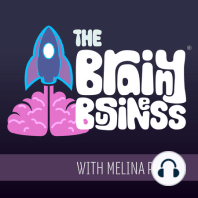59 min listen

282. Mental Accounting: Are You Doing It Right? (Refreshed Episode)
FromThe Brainy Business | Understanding the Psychology of Why People Buy | Behavioral Economics
282. Mental Accounting: Are You Doing It Right? (Refreshed Episode)
FromThe Brainy Business | Understanding the Psychology of Why People Buy | Behavioral Economics
ratings:
Length:
47 minutes
Released:
Apr 25, 2023
Format:
Podcast episode
Description
You’re likely familiar with accounting, so perhaps you can gather that mental accounting is essentially about how we account for things in our mind. But, you may not realize that it isn’t just mental math. This is about how we tend to create separate accounts for things in our minds that feel concrete, but often aren’t. When I give examples in this episode today, which originally aired in the summer of 2019, you are going to find yourself saying, “Well, obviously that is how it works!” And then when you realize it doesn’t have to be that way…it's kind of mind-blowing, but in a good way. Mental accounting is great in a lot of ways. It helps us to save money and prioritize things that we might have a harder time with if everything was all lumped together. But it doesn’t mean it is the ONLY way or even the right way. It might just be the best way our brains are doing it right now, and it is always a good thing when you can know the rules your brain is using to make its decisions as well as that of your employees, peers, customers, and more. So, why are we talking about mental accounting today? It’s because this Friday I am joined by Dr. Merle van den Akker, an expert on psychology and personal finances who runs the Money on the Mind blog. When she is here on Friday we discuss how the stress of money (fear of losing a job, concern about inflation, and the like) can impact employees. And, we of course take it a step further to unpack what businesses should know about these topics to better support their employees and why, even if a company thinks this doesn’t have anything to do with them…it absolutely does. This kind of stress has a lot of economic impact on an organization, and it doesn’t have to be difficult to support employees and achieve that win-win. We specifically talk about mental accounting in the episode, making it the perfect time to refresh it and get you set up for success for Friday! Show Notes: [01:21] Our brains make rules all the time. Sometimes they are really valuable — mental accounting is a great thing in a lot of ways. Sometimes, they aren’t necessarily serving us well. [03:21] The concept of mental accounting was introduced by Nobel Prize winner Richard Thaler and is based on a human’s illogical approach to value in relative terms instead of looking at it as an absolute. [06:00] Three examples of how mental accounting can impact the decisions we make. This concept is very ingrained in our brains. [08:22] Money is commonly labeled as either: expenses, wealth, and income. [10:48] Much like regular accounting in mental accounting, individuals will book and post any occurring or planned transactions to the mental account. However, small items may not be booked in the same way as a big item would be. As long as it is below a certain amount it doesn’t have to hit the mental account. [12:38] We often don’t look at dollar bills and change the same. [15:31] Similar to the process of rounding up change at the grocery store, adding a small amount to an already large payment doesn’t feel the same as having that payment on its own. This is because of decoupling. [17:07] Vacations are enjoyed more when they are prepaid because it feels free. [19:06] There are times when prepayment is necessary and beneficial for the overall enjoyment of an experience. [22:34] When prepayment comes into play the impact of the payment gets completely wiped off the mental accounting sheet so its impact on the sheet becomes zero. [25:11] Instead, internalize how the brain is wired to make its decisions around mental accounting. [27:49] When it comes to wealth in these sorts of categories people are very influenced by paper gains and losses. [29:26] Where you keep the money mentally or physically matters, but it also matters how you came across the money in question. [30:53] The way you receive the dividend impacts your willingness to spend it. [32:17] While it is easier to give cash than gifts, in many cases when the gift giv
Released:
Apr 25, 2023
Format:
Podcast episode
Titles in the series (100)
19. Herding: Come On And Listen…Everyone Else Is Doing It: Herding is the topic of today’s behavioral economics podcast foundations episode. This concept is similar to the way animals herd and for many of the same reasons. For safety, being in the center of the herd offers protection from predators. There... by The Brainy Business | Understanding the Psychology of Why People Buy | Behavioral Economics